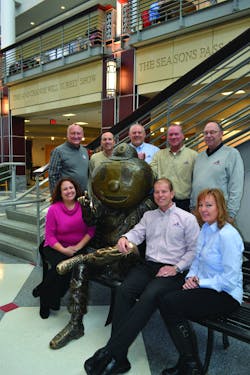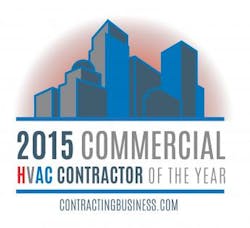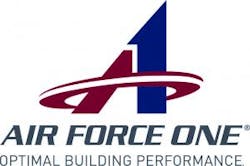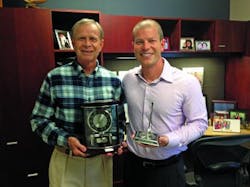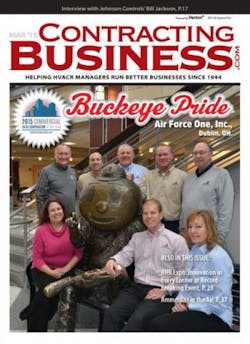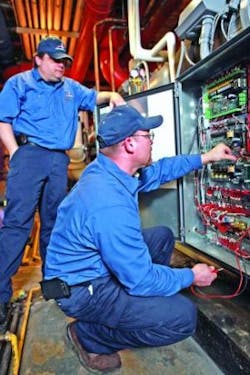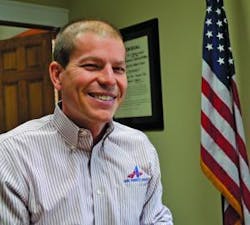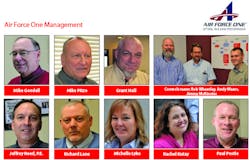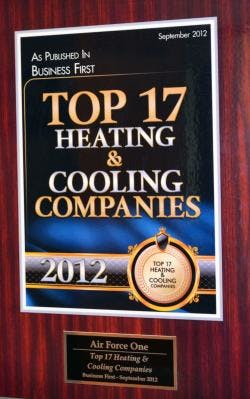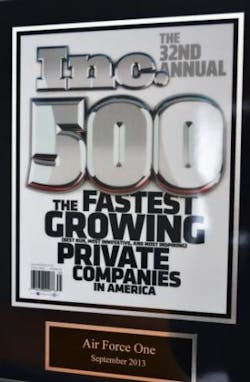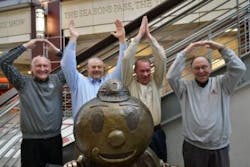ContractingBusiness.com 2015 Commercial HVAC Contractor of the Year: Air Force One, Inc.
As a wise businessman, Guy structured Air Force One as a debt-free company, by controlling overhead costs, insisting that, “nothing happens until an agreement is sold,” and by nurturing clients, with an eye to more work down the road.
“I started working for my dad at age 15, sweeping floors,” Bill Guy recalls. “I drove a truck through college, and then served as an estimator and project manager. I was with dad’s firm for 18 years, the last seven as president.”
But Bill Guy felt that something was missing.
“Over the course of the last few years that I worked there, I realized there were some things that needed to be done differently. It was very much a ‘we/they’ atmosphere,” which was a result of the company’s labor arrangement at the time. Though the company was successful, labor issues, and the firm’s plan-and-spec focus was not how Bill wanted to play the game.
“You would bid on price, and you couldn’t sell on value,” he explains. “We were very good at what we did, and the state of Ohio was very happy when we won one of its projects. They knew of our integrity. But, we had to be the low bidder, and then had to figure out how to make money as the low bidder.”
To increase its margins in a plan-and-spec market, J.A. Guy specialized in work that involved more sophisticated controls and comfort systems: prisons, powerhouses, laboratories, Army Corps of Engineers, Wright-Patterson Air Force Base.
“We developed expertise in a variety of complex engineering technologies, where other companies didn’t want to deal with the paperwork, or the mechanical systems were too complicated for them,” Guy explains.
By staying true to our values, we’ve been able to handle the growth we’ve seen without losing sight of the quality of service that we want to be synonymous with the Air Force One brand,” — Greg Guy
Air Force One Takes Off
Bill Guy founded Air Force One in 1984 as a subsidiary of J.A. Guy, and one year later, purchased it from his dad. He established Air Force One’s original business concept, marketing plan, philosophical core business direction, and its implementation. Through 2003, he managed sales, operations, accounting, and the formation and direction of the internal managers. Additionally, he developed a new set of core values based on a more concentrated team approach, and on the adoption of Design/Build construction methods.
As a wise businessman, Guy structured Air Force One as a debt-free company, by controlling overhead costs, insisting that, “nothing happens until an agreement is sold,” and by nurturing clients, with an eye to more work down the road.
“It was very important to build long-term relationships with clients, so that when they thought in terms of mechanical expansions, renovations, retro-fits, remodels, replacements, energy management services, emergency services and data centers — they would think of Air Force One,” Guy says.
Technically, Air Force One expanded further into complex and out-of-the-ordinary markets and projects, in much the same way as was done at the J.A. Guy company.
“We continued to develop our expertise in engineering procedures that could earn higher margins, and in projects not everyone wanted to take on,” he says. “Not many companies want to go into prisons or mental institutions, or didn’t want to venture outside of Columbus, Ohio. We ultimately became prime contractors, where we would win the bid, and the general contractor and the electrical would be under our wing. We would do all the mechanical systems, plumbing, HVAC and controls, which would be 55-60% of the work. It worked well for us. That’s how we were able to remain successful: by defining complex and different markets in which we could maintain a higher profit margin.”
A New Coach
Air Force One CEO Greg Guy always wanted to work with his father, and once Air Force One was established, he had his chance. And, like so many contractors’ sons and daughters, he was a youngster when he started as a part-time helper, doing odd jobs around the shop.
“As the years went by, I did whatever I had to do to learn the business. I worked in tight spots, and held up a lot of ends of pipe,” he laughs.
Through those formative years and into adulthood, Greg progressed from technician, to service estimator, to sales rep, to vice president, then eventually president and CEO. He was named CEO and became majority shareholder on Christmas Day, 2009. Greg has nothing but high praise for his dad.
“He and I have always been best friends, and I’ve always had a tremendous amount of respect for my dad,” Greg shares. “As a businessman, ‘passion’ would be the word that comes to mind when I think of my dad,” he says. “He’s got so much drive and energy and raw charisma, that it galvanizes people. And that’s what he needed to break out at 40 and start his own company with two children. He had a drive to do it, and he had a lot of support from my mom, Cheri. She helped manage the books when they had started and for 16 years afterwards.”
Bill Guy brought Greg into the business carefully, insisting that he learn it before he inherited it.
“Greg does not walk in my shadow. He’s quite a young man,” Bill says. “I saw so many family businesses where the parent bestowed the corporation on someone who maybe didn’t have the same enthusiasm, capability and commitment. They set the son or daughter up for failure. The best companies are the ones whose sons or daughters assumed the mantle but who also wanted to learn and live the business. You drive a truck, work in accounting, do whatever you have to do.
“You just can’t “make” that person a president or CEO. They have to be able to inspire others to great achievements. Greg does a fabulous job of that.” Indeed, their methods work. For three straight years, Air Force One has been on the Inc. 500 list of the fastest growing companies in the U.S., and in 2014 it was named one of the “Top Work Places” by Columbus CEO magazine and WBNS -TV.
Winning Differentiators
Air Force One’s greatest advantage over its competitors is its long history of working with building owners, to develop solutions that bring facilities to new performance levels, with reduced operating costs. A major part of that is in prevention.
“The majority of what we do for data centers is in preventive maintenance,” explains Paul Postle, critical care service manager.
“Data centers is a customer base that believes in preventive maintenance, and is reactive to what we find needs to be done. Having the right technician, with the experience to perform preventive maintenance is crucial for the process to work,” Postle says. “The last thing the customer wants is for the equipment to fail after hours or on a weekend. If we can prevent a potential problem, we’ll address it at that time. I bring that message to customers, that we’re proactive and preventive.”
Building automation is a key Air Force One service and installation sector. It recently completed an office expansion for its building automation team, led by Andy Mears, application engineer. A unique project board Mears designed allows the team to simulate real world situations, and test out equipment that will be installed in a customer’s space.
Training to Meet the Challenges
To ensure its training is in line with project requirements, Air Force One offers its technicians an apprenticeship program which includes 8,000 hours of on-the-job training and 576 hours of related technical instruction. It’s putting the finishing touches on its Integrity Training Center, with a program that is in the process of becoming accredited for continuing education credits.
“We have an aggressive growth plan. At any time there can be four to 10 people in the hiring process,” says Rachel Kutay, director of human resources. “We’re always interviewing, recruiting, looking for the next person. We’re growing and selling more work.”
Taking the Field with Passion
The key element to Air Force One’s continued success is its passion for finding opportunities for improvement, while staying focused on what makes the team who they are, as stated by the company’s core values: humble, hungry, filled with integrity, and intelligent.
“By staying true to our values, we’ve been able to handle the growth we’ve seen without losing sight of the quality of service that we want to be synonymous with the Air Force One brand,” says Greg Guy.
Bill Guy adds: “This award will allow us to be better, to raise our own bar. You really do win with outstanding players. You can have a great game plan and values, but you really need great players.”
Congratulations, Air Force One, Inc. — The 2015 ContractingBusiness.com Commercial HVAC Contractor of the Year — winners in an ever-challenging, changing, and critical area of commercial contracting.
